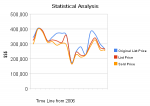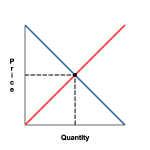Short Sales are a tricky beast. There are two sides to the argument when it comes to paying off a loan that you’ve promised to pay. The first argument is that you’ve signed a promise to pay and you have a moral obligation to do so. The second argument says that the lenders took advantage of us, so why should be pay them back? They are the cause, right?
It doesn’t exactly work that way. When you signed the note on your home, there was no clause within it that stated that you promise to pay “when the market is good.” You signed a promise to pay no matter what. Let’s face it. I think we all can take a step back and say that we’ve learned a huge lesson about borrowing money in this day and age, and the lenders have clearly taken a step back to re-evaluate how they lend money. So, it’s arguable that both parties are at fault for the disastrous market conditions.
That doesn’t release you from the obligation that you agreed to. So, what are you supposed to do now? Repay, or walk away?
That all depends on your financial outlook. If you are in a position of financial distress, and you’re headed towards an inevitable foreclosure, then you’re probably a candidate for a Short Sale, which is the best option for you because it’s not really walking away. It’s asking the lender for permission to sell for less than you owe. Foreclosure is what happens when you simply don’t pay. Foreclosure is not an option, it is a symptom. People who don’t pay their mortgage lose their homes. People that walk away from their homes, lose their homes.
It’s critical that you determine whether or not you qualify for a Short Sale. A short sale allows you to move on with your life with the permission of the lender. The lender agrees to release you from the note, and release the mortgage, and in most cases, you can walk away with peace of mind and a bright outlook on your future.
Why would a lender allow this?
Banks don’t want real estate. They want money. They lend money to make money. Without cash, a bank goes out of business. We’ve seen this happen time and time again. When you quit paying your mortgage, and the bank reposesses your house, they have to spend thousands upon thousands of dollars to maintain the house, prepare it for sale, and sell it. It will cost them more to foreclose than it will to allow you to sell it for current market value.
You have a moral obligation to pay your debts. You signed a promise. When you walk away, you are invalidating your credibility and as a result, regaining trust in you as a borrower will take years. Don’t walk away without attempting to sell the property, and make sure you hire someone who knows what they’re doing.






